Because of Holt sponsors and donors, 7-year-old Anis gets to learn and grow each day at his school in southern Thailand. But when he leaves school for the day, his education is just beginning…
At the fishing dock near his home in southern Thailand, 7-year-old Anis concentrates to untangle a squirmy, translucent crawfish from the net. It’s late in the day, and he’s dressed in his afterschool clothes — a red soccer jersey, yellow shorts and Crocs. The ocean air is thick and humid, and it has slightly curled his hair in front.
Next, Anis detangles a tiny crab with a bright purple claw.
“I am very proud to help my father,” he says shyly, then tosses the catch into a shallow rubber tub. His father, Burhan, looks on with approval as his son squats alongside him at the fishing net, then smiles as Anis jumps up and runs to join the other kids climbing on the fishing boats.
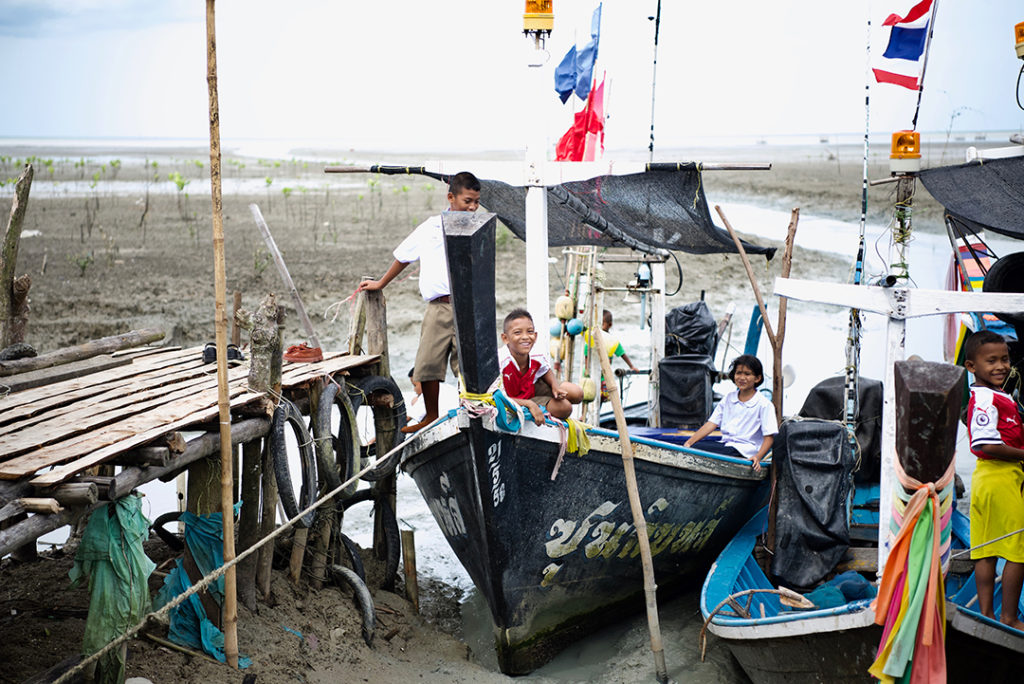
A little work, and a lot of play, is how Anis and his two siblings spend their days. And all day long, they are learning — both in and out of school.
With support from his sponsors, Anis attends elementary school each day. But this is only where his learning begins.
A Thai Fishing Community in Crisis
The children who go to Anis’ school are part of a Muslim community — a minority religious group that is marginalized from mainstream Thai culture. They’re considered dirty, ‘less than’ and poor. Excluded from most aid opportunities, there are few chances for them to advance or rise above poverty. More than anything else, they needed compassion and an opportunity to pursue a better life.
“When you work closely [with them], you get to know them,” says Jintana Nontapouraya, who for over forty years has served as executive director of Holt Sahathai Foundation (HSF), Holt International’s partner organization in Thailand. “For us, we accept them the same as anybody.”
About seven years ago, HSF began working at Anis’ school after receiving referrals for about 14 separate families in dire situations.
Poverty is widespread here. For decades, the income from fishing has steadily decreased as commercial fishing boats invade the Gulf of Thailand and harvest the majority of the fish — leaving only remnants for a community that has fished these waters for generations. There is still some income to be earned, but it’s not enough.
This poverty hits families the very hardest, families like Anis’ that grew to include five, but each year became threatened by fewer and fewer fish.
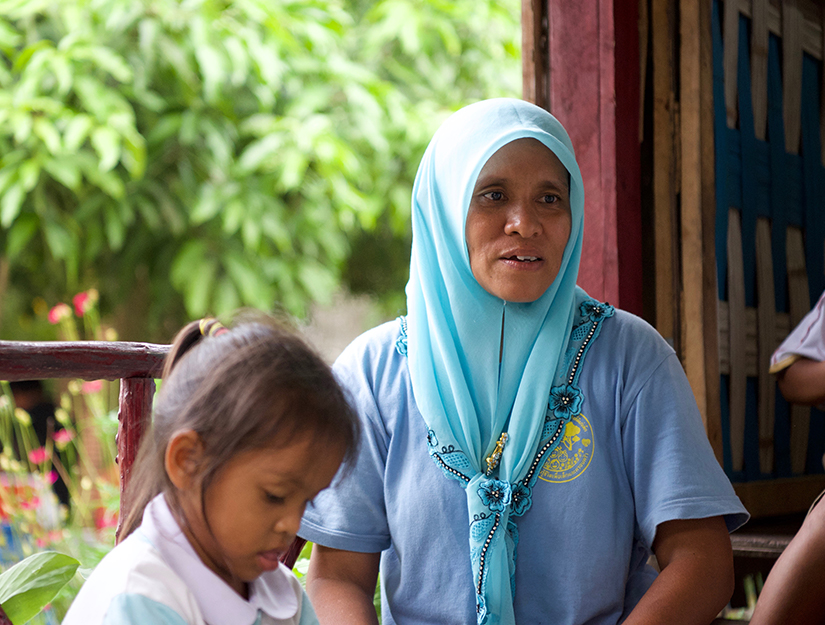
“I had just moved to this place and was very financially limited,” says Anis’ mother, Maisha, as she sits on the bamboo-slatted porch of their home. Her soft voice and demeanor confidently, yet with emotion, recount her situation from just five years ago when she first got in contact with HSF. She had just had her third child, a daughter, and was working as a day laborer at the fishing docks where her husband came in and went out to sea each day. They both had to work such long hours that 3-year-old Anis was often left in the care of a neighbor, or sometimes with his brother, Daris, who was just 6 years old at the time.
Anis was malnourished. Both he and Daris seldom bathed and had constant runny noses. And because they didn’t wear shoes, there were ant bites all over their feet and legs.
Right away, their family joined HSF’s program. An HSF social worker began working with their family and each of the children was matched with a sponsor. The whole family began receiving support.
“HSF helped with support for our oldest son’s expenses at daycare, like his tuition, uniform and school supplies,” says Maisha. “They provided our family with rice, eggs and milk.”
And from that point forward, their lives became strikingly different.
HSF’s goal in these rural communities in Thailand is to not just give families what they need to get by, but to empower them to provide for their children and overcome poverty for themselves. Although an English-language proverb, the saying, “Give a man a fish and you feed him for a day; teach a man to fish and you feed him for a lifetime,” is a literal and figurative truth here. Anis and his family were already expert fishermen when they connected with HSF, but through donor-supported programs, they grew more empowered — learning to “fish” in other ways and becoming the healthy, self-sufficient family that they are today.
The most important aspect of this empowerment? Education. And the first step is making sure that Anis and children like him go to school.
But it’s not always that simple.
Going to School
In this marginalized community in southern Thailand, it’s uncommon for the adults to have even graduated from high school. And it’s easy to see why. In a rural community like this, some assume that a formal education isn’t necessary. And even if parents do want their children to go to school, the government’s requirement of school supplies and five different uniforms — one for each day — is costly. A cost that many in this fishing community simply can’t afford.
But for the past five years, Anis and his siblings have gone to school and received an education, all because of their Holt sponsors. Their school fees are covered and they have each of the five uniforms they need.
At school is where we first met Anis. In a white collared shirt and brown, belted shorts, he emerges from his classroom of 40 other students.
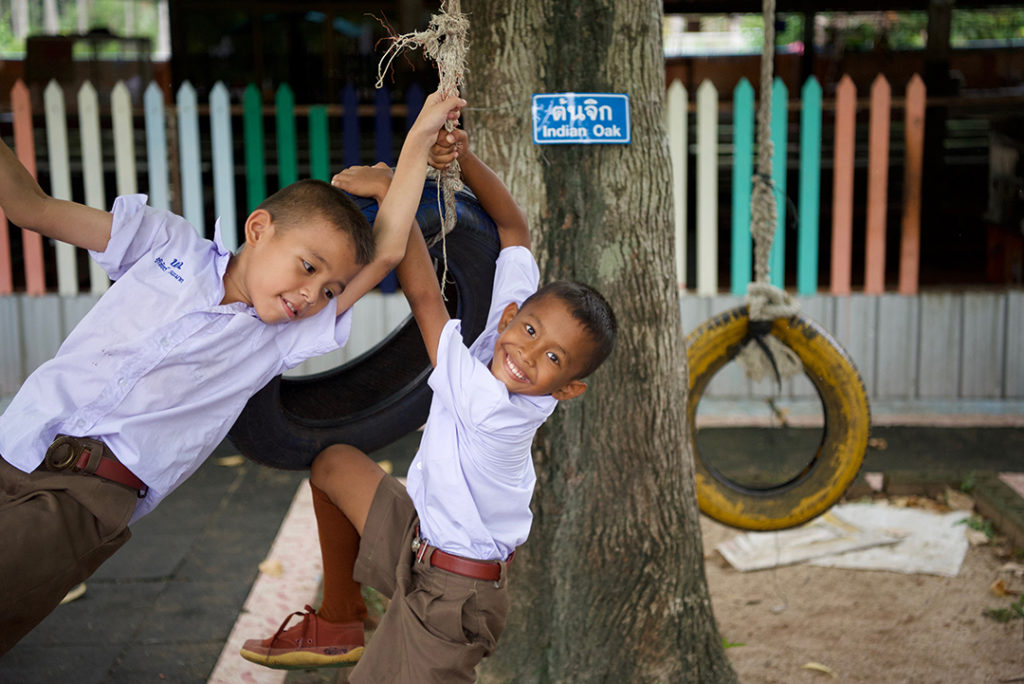
Anis is shy at first, but his wide, confident smile comes easily as soon as his friend walks up to him. School is done for the day and they walk out of their classroom and sit on the bench to put on their shoes before running with oversized backpacks to jump on the tire swing. Maisha comes and grabs his hand — it’s time to visit Dad at the docks.
Fishing
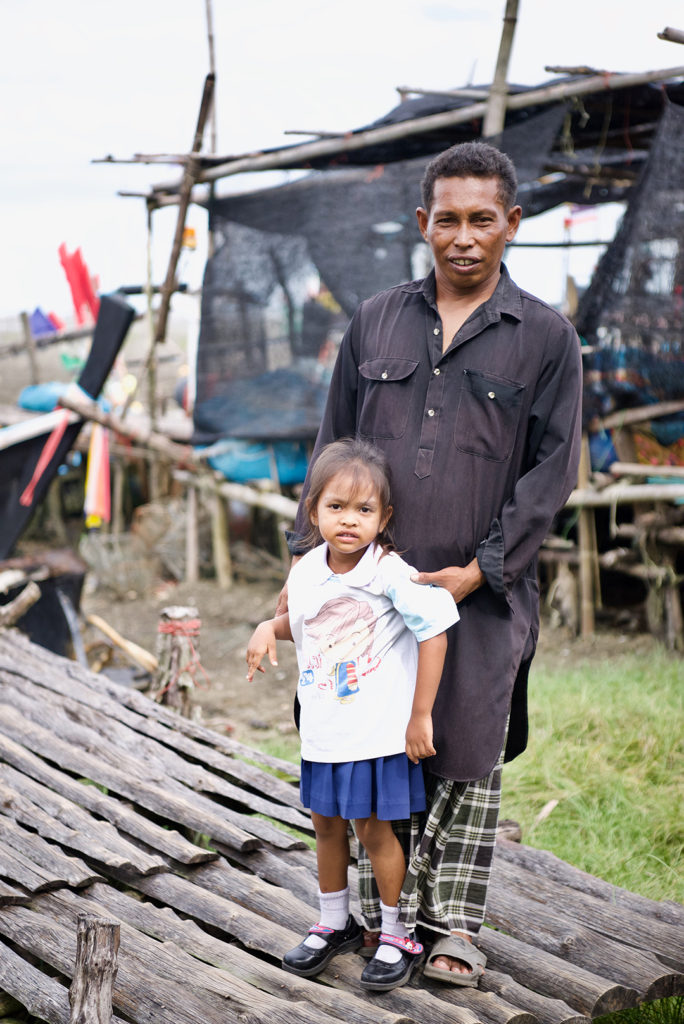
Most days after school, this is where Anis, his siblings and most other kids from school go to see their fathers. The ground holds deep, muddy ruts and is strewn with remnants of fish and crabs — a draw for the litter of small cats that roam this area. Men gather around their boats as they get back from the ocean with their catch, then lug their nets to the shore.
In this community, fishing is traditionally the man’s role in the family, and is passed down through generations — from father to son.
Each morning Burhan, Anis’ father, wakes up hours before the sun comes up to go out to sea on his own father’s wooden boat. He returns hours later and then waits until his children are done with school to go through the nets.
Anis helps untangle the day’s catch from the nets, then neatly wraps them up for tomorrow morning at 3 a.m. when their father goes out again to the ocean.
Although Anis is young, he has done this all his life. Every day he watches his father, and his father patiently teaches him what to do. Someday, perhaps, his grandfather’s fishing boat — one of the largest here at the dock — will be his.
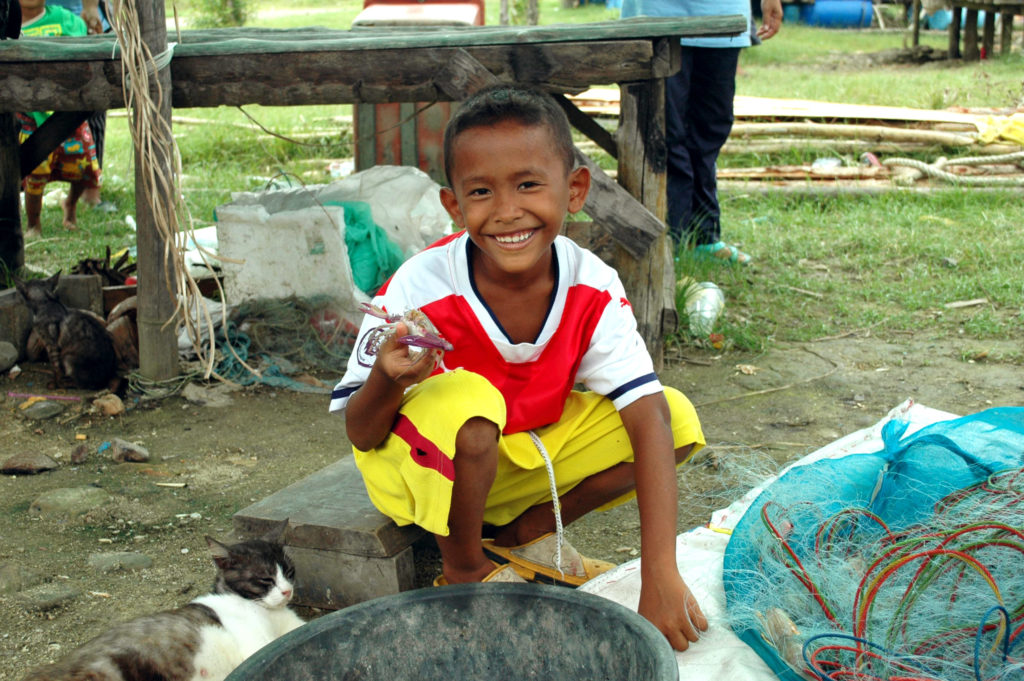
“The fishing people, they don’t pay good attention to savings,” says Anis’ grandfather. He’s been a fisherman for all of his life, and has the dark, weathered skin to prove it. In the past several decades, Thailand has gone through a transition in which more and more people are moving to the city and leaving their traditional way of life behind, which for many is the beginning of intense financial difficulty.
“People used to love the village wisdom of their people,” Jintana says. “But it is not the case now. People go far away to get money, but that is not the most important thing.”
In their growth over the past five years, Anis’ family has come to understand what their most important things are. And this new understanding does have something to do with money, but they’ve learned to think about it in an entirely different way.
Community Support & Savings
On a dark tarp under shady trees next to Anis’ home, a group gathers. It’s now 2:00 p.m. and the children are excited to be out of school and home from the fishing docks. They huddle around a concrete basin and catch tadpoles before running over to the snacks — green mango with chili sauce and sticky rice wrapped in banana leaves. An older woman chats with her neighbors as she sits over a sudsy, lemon-scented bucket with a stick, stirring and making the dish soap to be distributed to the group.
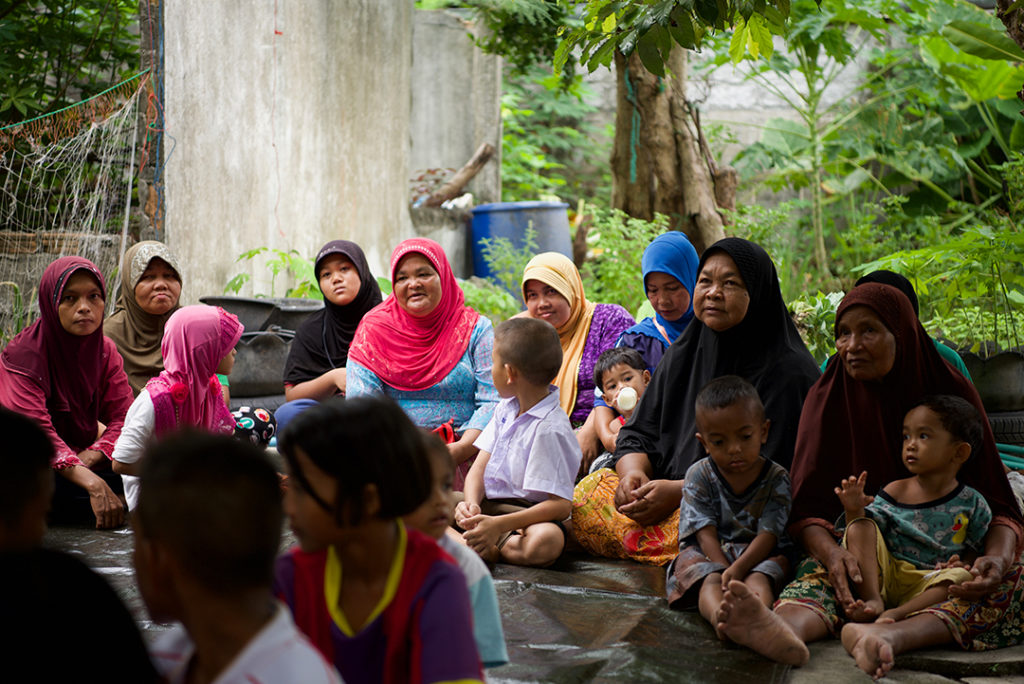
Today these neighbors gather for one very important reason: This is a Holt community support group, and children and their parents alike are here to learn.
Wherever Holt-sponsored children and families live in Thailand, community support groups are a critical part of their development. HSF social workers facilitate support groups on parenting young children, parenting twins and triplets, for families who like gardening, for children who like sports or those who like books — whatever situation a family is in, or whatever interests their children have, there is a place for them. These groups are places of community, accountability and learning. And this group, a group focused on financial savings, is much of the reason for the transformation that took place in Anis’ family.
Maisha, the leader of the group since it began five years ago, quiets everyone and makes sure they are seated before she walks over to an easel and begins. Everyone sits attentively as she begins to speak and write on the large white pad of paper in front of her.
The group becomes serious as they begin to discuss the thing they have worked so hard toward: their savings.
Each month, members deposit their savings into the bank account they hold as a group. As of today, they have raised 101,000 Thai baht — or $2,974. This is a lot for a community in which each family makes an average of $68 per month. Each family in the group can use some of this money if they have an unexpected doctor or hospital visit, and they use this money to buy rice and other foods in bulk at a cheaper price to distribute throughout the group. But most of all, they are saving for their children’s future education.
“This encourages them to have savings and help each other,” Jintana says.
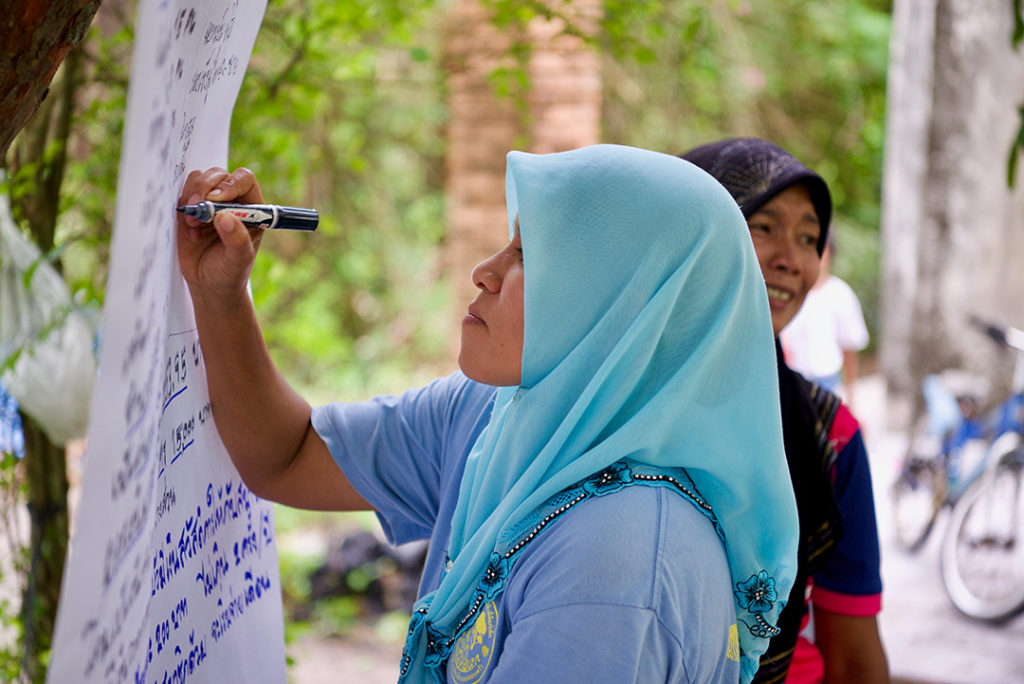
Maisha is a kind, confident and respected leader. For a woman to lead like this is especially uncommon in their culture. Maisha and her family are a model of what successful savings and development look like and she is committed to sharing what she has learned with her community.
“This has been a very rewarding job, being able to share my experience with other mothers and parents who share common experiences,” she says. “It’s tiring being the leader, but it’s very rewarding seeing people change. I am happy every time I get to share my story.”
But this group isn’t just for the adults. Anis, his siblings and other children of parents in this group also sit in front of the paper that Maisha writes upon, and pay close attention. They are learning to save, too. When the children help their families, whether at the fishing dock or for other chores around the home, they are paid a small amount for their help — and then they are taught to save it. More than that, children like Anis see their parents’ willingness to learn and stay accountable to each other in their savings, and in their desire to create a better life for their families.
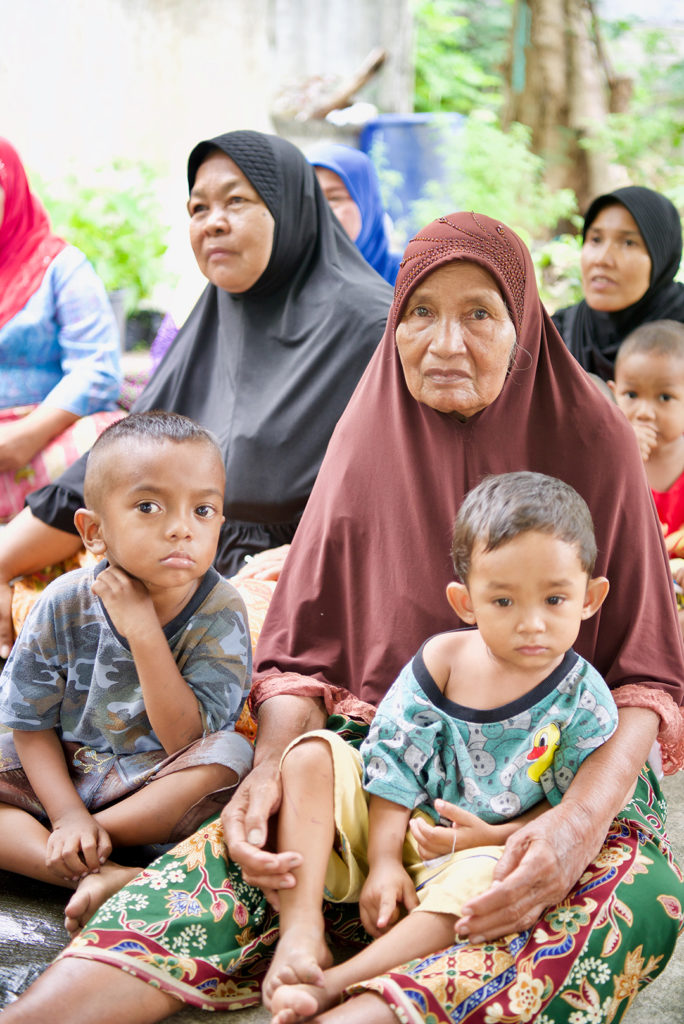
“Not all receive material support [from Holt sponsors], but being a part of the group is very meaningful for them,” Jintana says, “and they want to be a part of it.”
As a community, parents and their children learn that they can depend on each other, and that they have the power to change their situation.
How has this group continued and grown over the past five years? “Because of trust,” Maisha says. “The heart of the group is trust.”
Learning & Reviving Culture
As the group comes to a close, the children start to squirm with a nervous energy. You can tell they’ve been sitting patiently throughout the whole group for this one moment. And soon we see why.
They line up in rows in the same place that they met and sit down cross-legged. Some have shakers, a tambourine or a drum. A beat begins and they move their knees up and down in the sitting position and begin to sing.
It’s a traditional folk song and dance called the Likae Hullo. It tells the story of when their people were forced south into the waters of Malaysia in order to find fish, but the words of this song are a plea for their husbands, fathers and brothers to come home. Anis and his brother and sister perform the motions and words with full energy and enthusiasm.
This is part of their traditional culture, or “local wisdom,” that Jintana mentioned earlier. It isn’t usually taught to children anymore, but the families in this Holt support group have made it a priority.
“We have encouraged the parents to keep this alive,” Jintana says. “The parents like this because the children want to do something other than video games.” Their performance group has become widely known and they are even asked to perform. The children are sometimes paid for their performances, which they then put towards their savings.
Children are learning about their history and culture as well as learning how hard work and practice pays off. They’re reviving their local culture, and finding meaning in it as the youngest generation of their people.
Gardening
Anis’ home is a place of clean, cultivated beauty. Bright green leaves and delicate pink and orange flowers border the side of their home. Gardening is Maisha’s passion, and she shares it with her children.
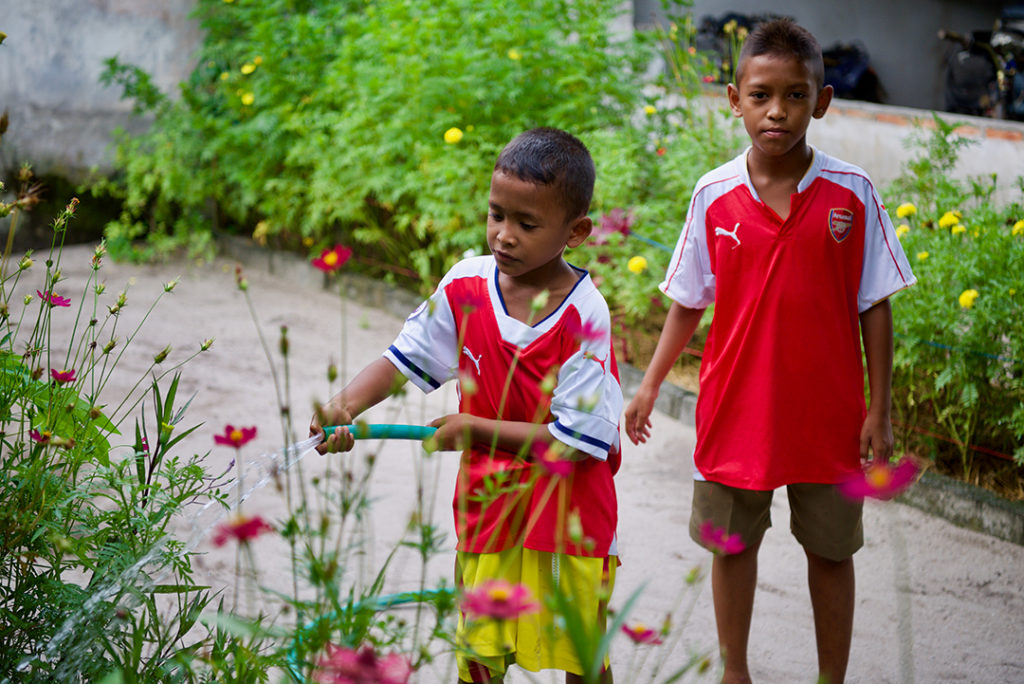
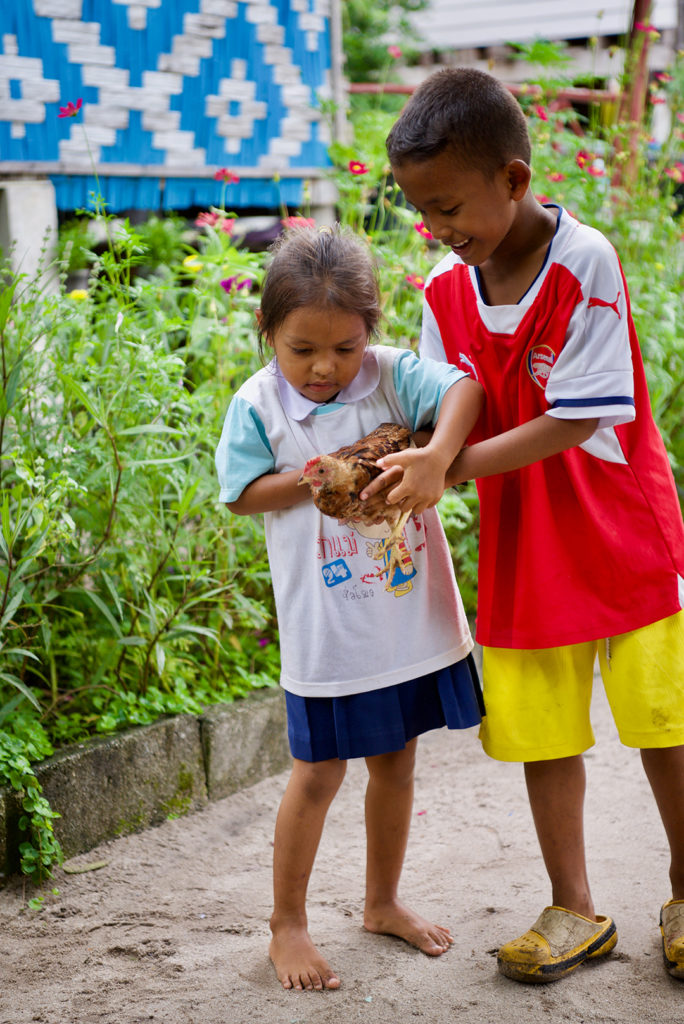
As the community support group dismantles and families leave for home on their motorbikes, Anis and his brother and sister begin their favorite chore: gardening. They turn on the hose, and 5-year-old Nada picks up her red plastic watering can. They walk through the lemongrass, green beans, peppers, carrots, banana trees and herbs.
Before Maisha began her garden, their family had to spend much of their small income on fresh fruits and vegetables from the market. But with the garden, and the ducks and chickens they raise on this same property, now they grow almost all of their own food.
“They have fun working together,” Maisha says about her children. “They have a fun time and learn to be responsible. They even have their own savings from selling vegetables at the market.”
It’s like their garden symbolizes how Anis’ family is doing now: healthy, well cared for, thriving.
“I have learned that gardening is good for both physical and emotional health,” Maisha says. And she is passing this knowledge and health along to her children.
Because They Know How to Fish
When the watering is done for the day, the children sit on their bamboo slatted porch and finish their homework in the receding evening light. Anis works on spelling and Nada proudly shows her drawings from preschool — she recently won her school’s coloring contest.
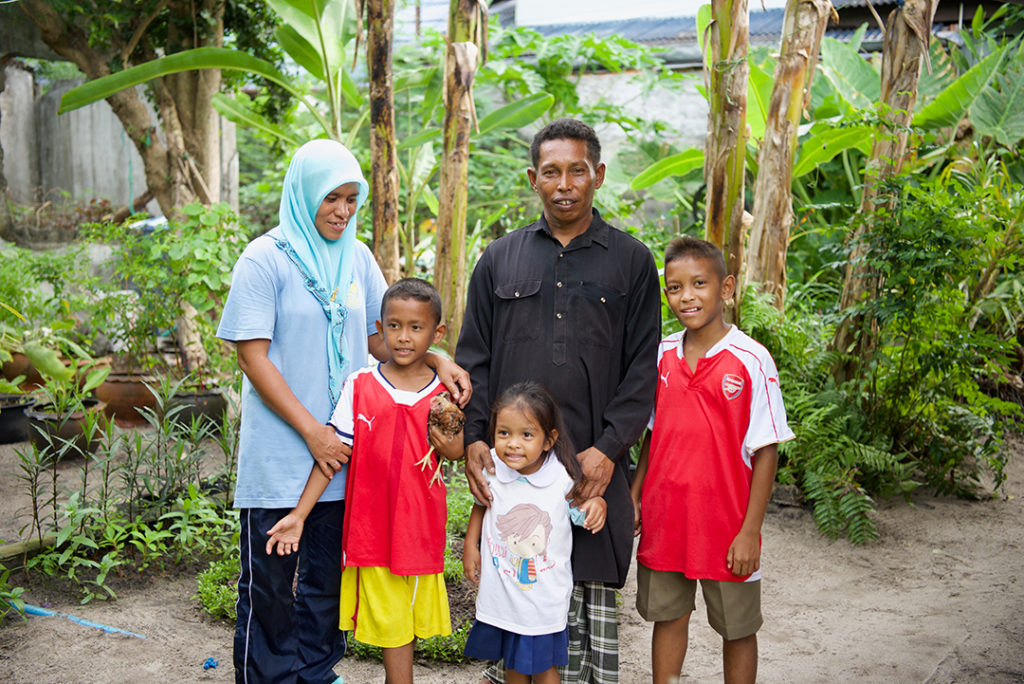
They know that working hard in school will pay off later, and they are proud of their work.
Maisha says that no matter what they become, she hopes they find a good occupation, and maybe even attend a university someday. Like the other mothers in their community, higher education is one of her primary concerns, and what she hopes is the result of all of their savings. And with continued dedication in their savings and help from their Holt sponsors, someday, higher education just might be an option.
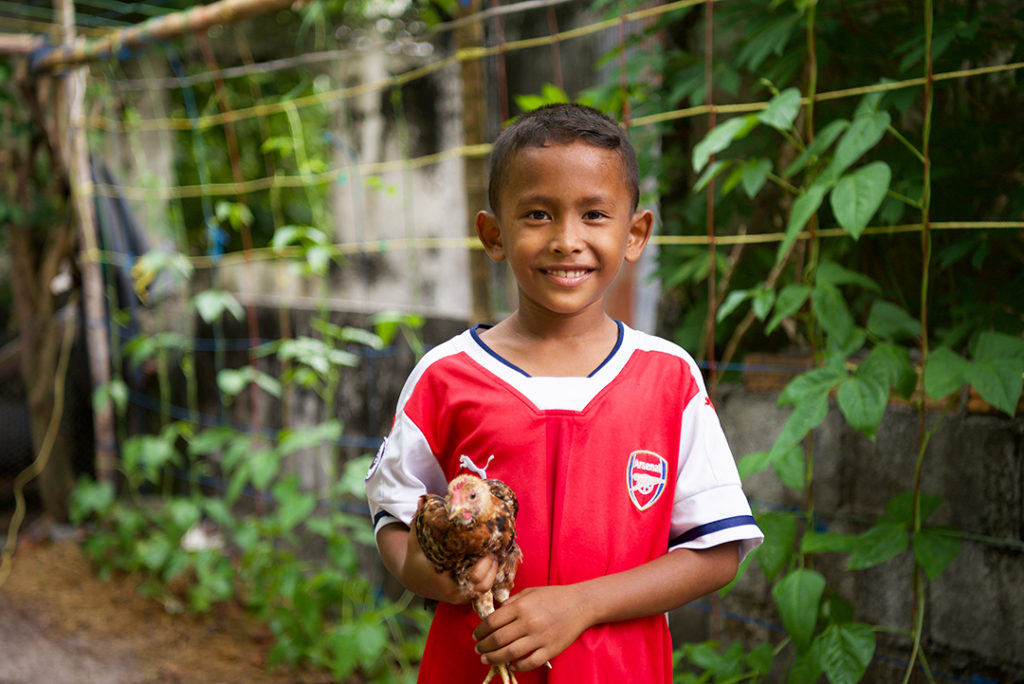
What does Anis dream of becoming someday? “A pilot,” he says. This is Daris’ dream as well. “I want to fly!” he says. Nada first answers that she’d like to grow up to be a passenger in her brother’s airplanes. Maisha laughs and tell us that she normally says she would like to be a teacher. Maybe someday, she can be both of these things.
*All names changed for confidentiality

Send a Child to School
The gift of a scholarship covers tuition for one student to go to school for one year.

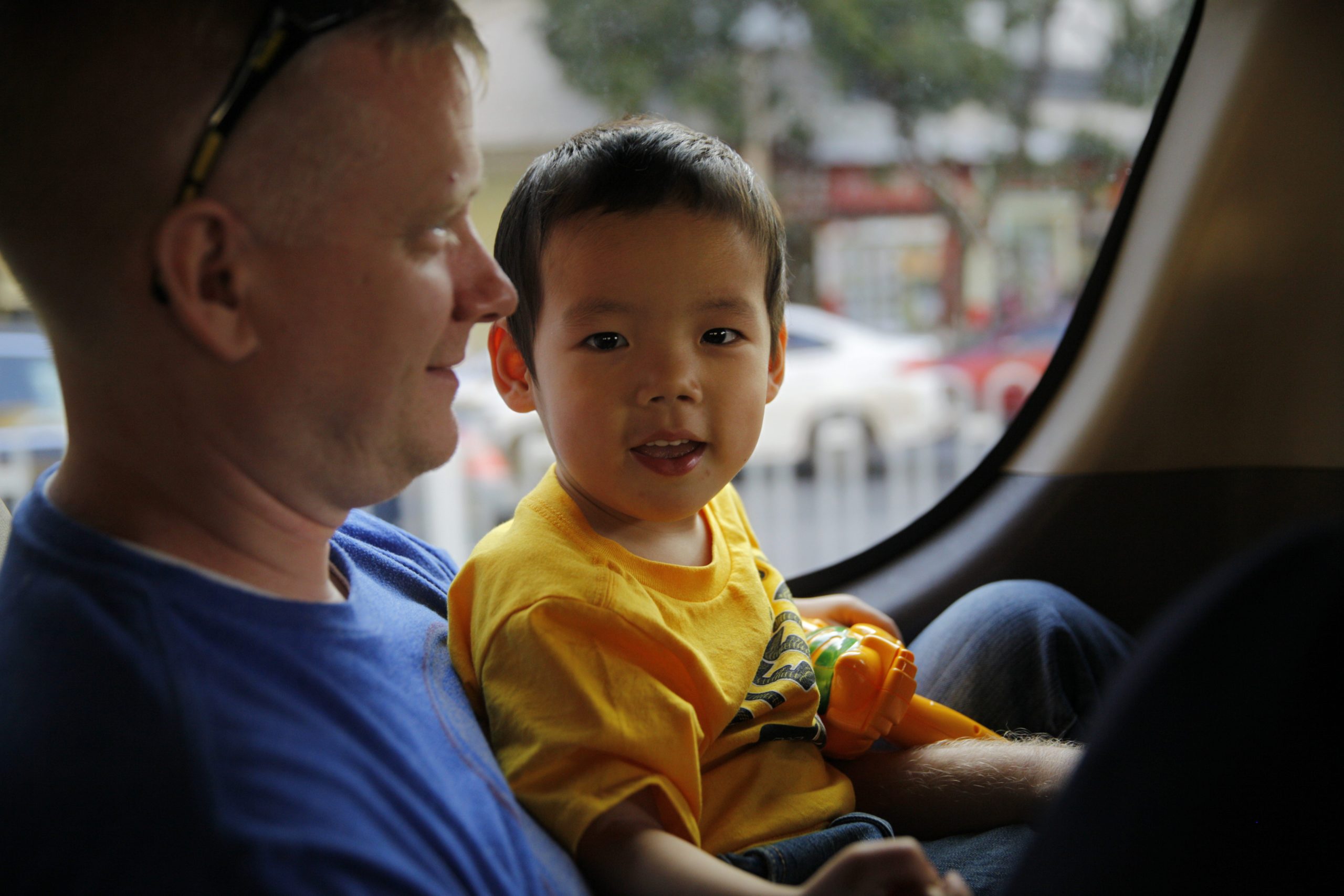
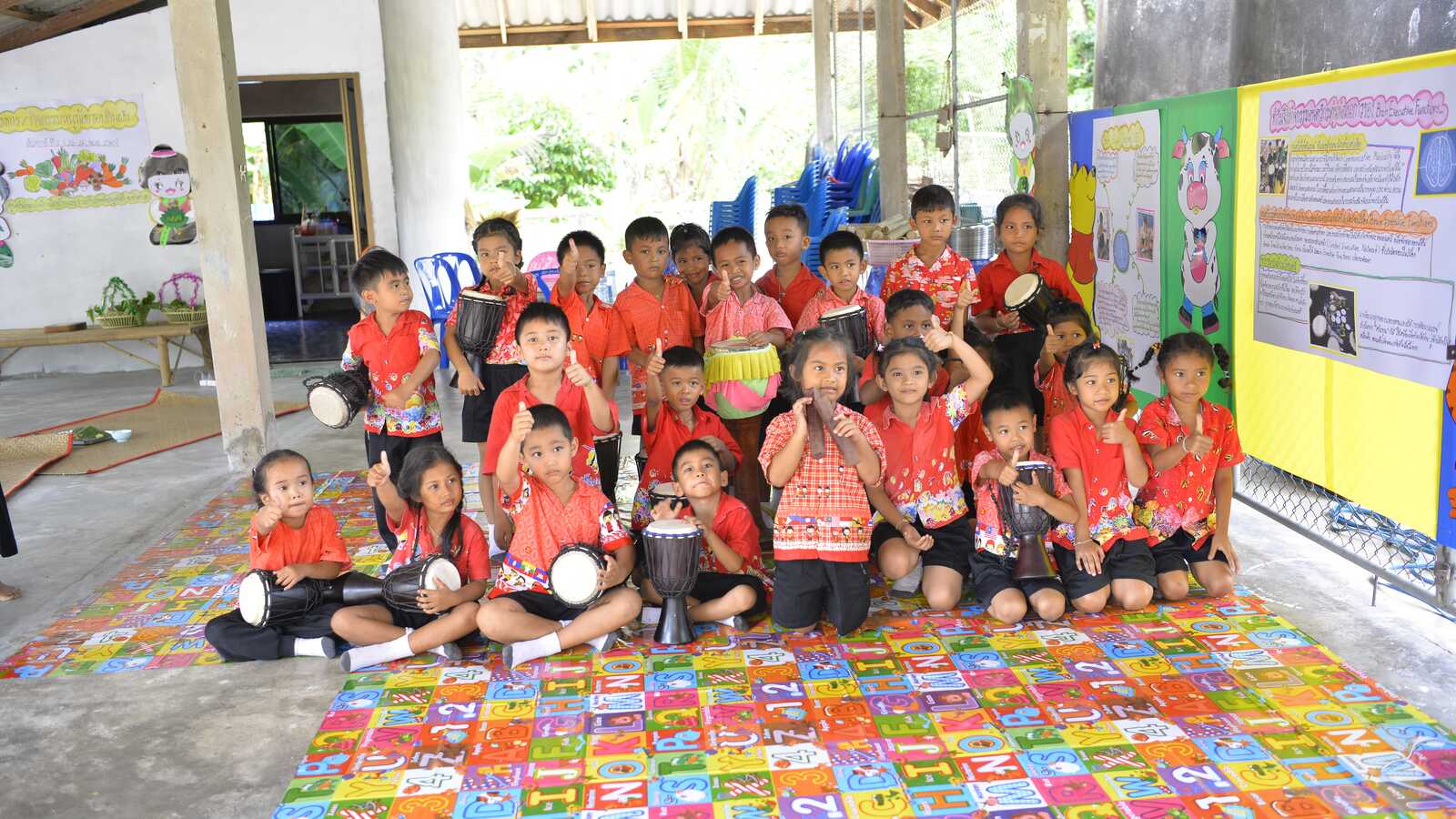


Thank you for that wonderful story about Anis and his family. My family sponsors a child in another country. It is a blessing to read what HOLT is doing for other families in other countries!